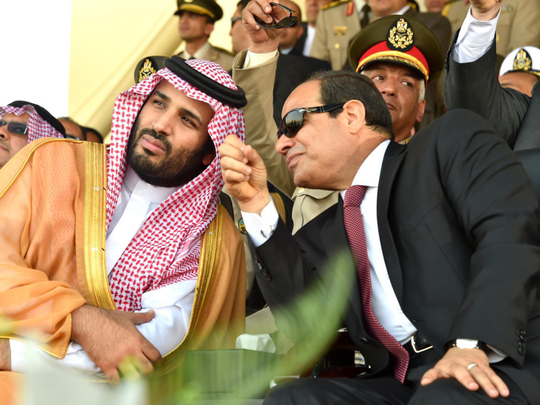
Cairo: Festering conflicts in the Arab region and a questionable agreement on Iran’s nuclear programme are prodding Egypt and Saudi Arabia to mend their ties, according to experts.
Last week, Saudi Deputy Crown Prince and Defence Minister Prince Mohammad Bin Salman visited Egypt where he discussed a Saudi-led war in Yemen and a recent pact between Iran and the world major powers, according to Egyptian media.
The visit came less than a week after Egyptian Foreign Minister Sameh Shukry went to Saudi Arabia amid reports that ties between both countries soured on Riyadh’s alleged rapport with Islamists and Cairo’s purported secret talks with Yemen’s rebels. Saudi Arabia has been leading a military campaign against Iran-allied Houthi rebels in Yemen since March.
“Relations between Egypt and Saudi Arabia are strong even if they are overshadowed by differences over some regional issues,” said Wahid Abdul Majeed, an expert at the Cairo-based Al Ahram Centre for Strategic Studies.
“In politics, no two countries could share identical views on everything. What matters most are realities on the ground, not verbal claims. All signs show that Egyptian and Saudi relations stand on a solid ground.”
During his one-day visit to Egypt, Prince Mohammad met President Abdul Fattah Al Sissi.
At a televised military ceremony attended by the Saudi official, Al Sissi called Egypt and Saudi Arabia the “two wings of the Arab nation”.
Following the talks, a joint statement, officially called the “Cairo Declaration” was released, promising wider cooperation between the two countries in all domains.
In the communique, Cairo and Riyadh pledged joint efforts to “consolidate regional security and stability… and block attempts to interfere in the Arab countries’ internal affairs”.
They also agreed on boosting military links and setting up a pan-Arab defence force, approved at an Arab summit in March.
While officially welcoming the Iran nuclear deal struck earlier this month, Gulf countries, including Saudi Arabia, and Egypt have expressed worries that the pact would expand Tehran’s influence in the region.
“The Iran agreement signals radical changes in the Gulf. This causes worry for the Saudis,” Salah Al Hadi, a political expert said. “Therefore, Saudi Arabia needs a regional backer such as Egypt. Tehran’s behaviour has changed for the worse since the nuclear accord. For example, its leaders continue to make hostile statements against Bahrain.”
Bahrain has recently recalled its ambassador to Tehran to protest what the Gulf monarchy described as Iran’s meddling in its affairs.
Iran, a regional rival of Saudi Arabia, has been repeatedly accused of instigating unrest in the Arab region through its proxies in Lebanon, Syria and Yemen.
“It is in the interest of Saudi Arabia to see Egypt always strong especially at this time of instability,” Al Hadi said.
Saudi Arabia backed the Egyptian army’s 2013 overthrow of president Mohammad Mursi, who hails from the Muslim Brotherhood. Saudis have since pumped billions of dollars into Egypt’s ailing economy.
However, commentators in the Egyptian media claimed muted strains in Egyptian-Saudi ties after Saudi monarch Salman bin Abdel Aziz came to the throne earlier this year, citing his alleged sympathy for the Muslim Brotherhood designated in Egypt as a terrorist organization. Saudi and Egyptian officials have denied any such strains.












